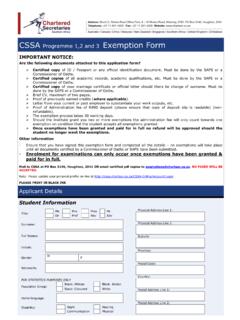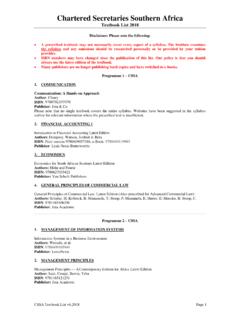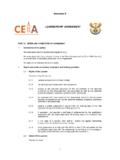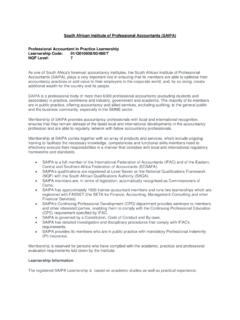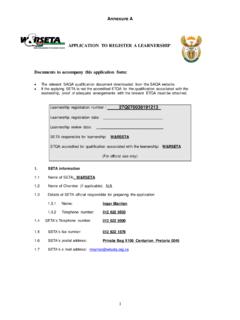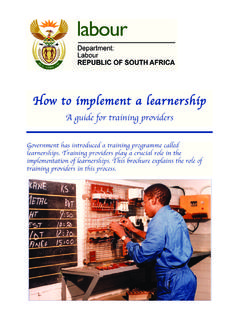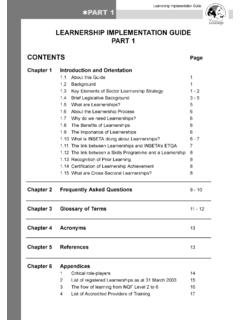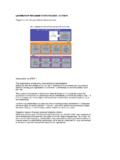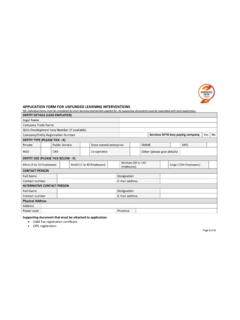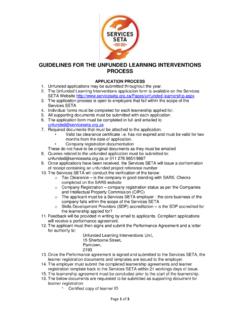Transcription of Learnership Description 60651 CIS Programme 1
1 1 Chartered Secretaries Southern Africa Learnership Title: CIS Professional Qualification: Management and Administration Learnership Code: 01/Q010034/00/120/5 NQF Level: 5 Learnership Description 60651 CIS Programme 1 Introduction The Qualification provides the learner with a level of knowledge and competence that can be applied in a practical workplace environment, and recognition for the level of learning that he or she has achieved. The Qualification provides the learner with the knowledge and skills that can be applied in a variety of entities as well as an understanding of their philosophy and operational requirements.
2 It also provides a step to a higher phase of learning in governance, administration and finance, and widens the learner's opportunities for advancement. The learner will be equipped with the primary skills to handle a variety of administrative functions within the scope of financial, legal, information technology, economic and communication skills. This infers the ability to absorb new learning as well as being able to apply the learning to a variety of familiar and new situations. This Certificate in Management and Administration provides an indication of the achieved level of competence of the learner and recognises valid and pertinent prior learning experiences.
3 The Qualification therefore provides the opportunity to individual learners to achieve recognition of their learning abilities through competence testing and recognition of prior learning (RPL) to help address the skewed demographics which South Africa has inherited. Rationale for the Qualification The Certificate in Management and Administration NQF level 5 is the second qualification in the learning pathway in Management and Administration that starts with the FETC Management and Administration and that ends with a qualification at NQF level 7. This qualification is ideal for the employee who has worked for many years in administration in a state department, a large business, or an SSME, and who has not had the opportunity to obtain formal skills recognition.
4 The range of learners includes those in a junior clerical position and extends up to supervisor level. Junior positions will typically be data entry clerks, word processors, bookkeepers, admin clerks and admin officers in Government departments. The personal assistant/secretary 2 has the opportunity to qualify as a Management and Administration specialist. These learners can also advance their careers in the Chartered Secretarial stream. The qualification is broad-based and does not focus on a single business skill but the common theme involves administration and management.
5 The need for knowledge of and competencies in management is growing in importance worldwide and there are no other similar qualifications currently available. The wide range of skills included in this qualification gives the learner a holistic understanding of the operational environment in which management and administration personnel operate, as well as a variety of clerical skills, and provides the industry and its clients with fundamentally competent professionals. Administration skills developed in this learning path would have a bias towards management and administration; however the training should be such that individuals can apply the learning in businesses and organisations, including the state, where the solutions are based on a variety of other areas of knowledge or technologies.
6 Personnel who are developed through this qualification also develop entrepreneurial, financial and marketing skills. Such expertise is becoming increasingly necessary in the South African economy in order to develop people who are able to create business opportunities and unlock latent value. The qualification is designed also to meet the needs of learners who are already employed and involved in the organisational office environment. Additionally, however, it will also meet the needs and aspirations of the youth and unemployed who wish to pursue a career in business administration and associated fields, or in other fields where this learning may be useful.
7 This includes adult learners who want to enter the sector or develop their careers in one or more of the related learning areas. Since the qualification is part of a learning pathway, it will allow mobility to persons operating at any level in the field. The qualification provides learners with a consolidated grounding in the field of management and business administration. This will enable them to understand the South African and global business management and administration arena and will underpin their ability to use this learning in various business environments. The development of competence in this field will lead to better service delivery, company longevity, and the promotion of wealth and job creation.
8 This qualification recognises the fact that knowledge and the application of organisational management and administration is a business imperative, necessary for the success of any organisation, both strategically and operationally. This National Certificate in Management and Administration is thus designed to enable individuals to develop their theoretical competencies and the practical skills to operate effectively in the field of their choosing. The impact of the qualification on society and the economy is reflected in the multiple job roles and careers that can stem from the qualification, including self-employment opportunities, job creation opportunities and the development of, or entry to, learners who are employed within the private or public sector.
9 It can further stimulate and support skills development in the SMME sector. For an unemployed learner, the qualification will add value to the qualifying learner's employability. The employed learner will be able to apply his or her newly acquired 3 knowledge to the job, which enhances confidence and abilities. There is also the added value of requiring learners to study subjects that they may not otherwise have tackled. There is a burgeoning need for qualified personnel in Management and Administration in South Africa and this qualification addresses this shortfall, thus benefiting the economy.
10 This can be either through qualified learners entering the market as entrepreneurs able to run their own businesses, or as employees in NGOs, the corporate world, state departments or parastatal organisations. As such, they become wage and salary earners, thus contributing to the economy. Learnership Information The registered Chartered Secretaries Southern Africa Learnership is based on academic studies as well as practical experience. The aim of the Learnership is to provide an opportunity to gain the practical experience required of candidates wishing to become members of this Institute.
